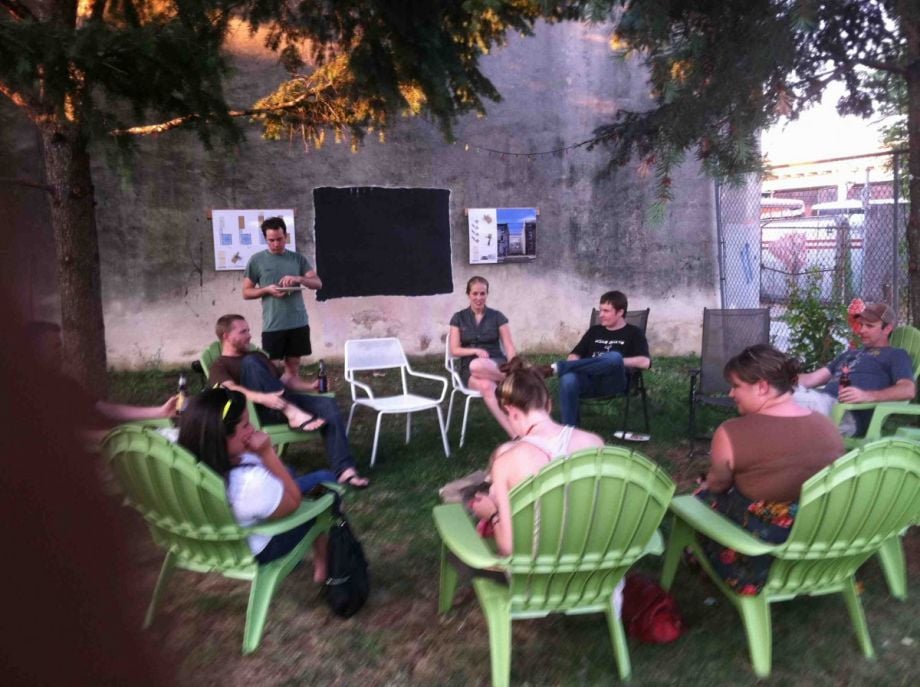As founder of Philadelphia’s Indy Hall, Alex Hillman is best known for creating a new kind of office. But six years after starting one of the first major coworking spaces on the East Coast — and certainly the most prominent one in Philly, though we love our own CultureWorks, too — Hillman wants to expand the idea from office to home.
Now, he’s planning a co-living community, called K’House (short for “co-house”) in the Kensington neighborhood of North Philly. We caught up with Hillman over email to discuss the new project.
Next City: What is the concept behind K’House?
Alex Hillman: A couple of years ago we started asking ourselves, “What else can we do with what we’ve learned while developing Indy Hall as a coworking community and space?” At the core, our model puts people and community, trust and relationships, as the top priority. These values have done well for us in the realm of work, but what would happen if we explored the rest of life, the places where we live? Indy Hall isn’t a great place to work because of the building, it’s a great place to work because of the coworkers.
NC: What is the status of the project? When do you plan to have people move in?
Hillman: One of the things that often slows — or worse, kills — co-housing projects is their scale. We knew this from the start and planned to start small and easy. But even then our original plan was big enough to run into some bumps in zoning approvals. Instead of letting those bumps kill the project, we remembered that a fancy building isn’t as important as facilitating the interactions both inside and outside of it, and we could do that at any scale.
We broke the project into smaller phases that we could iterate through, ultimately creating more value and helping establish the critical foundation for the community along the way. With that in mind, we’ve been able to execute a plan that will have us building our first living space for some founding members over the summer, and we’ll be moving in this fall.
NC: Why Kensington? Is K’House a purely Philly project, or could this be in any city?
Hillman: Our partners at Postgreen Homes really helped us see Kensington in a new light. It’s an urban neighborhood with an interesting history. And most importantly, it’s got an amazing community developing already. It’s not like we’re going into a neighborhood to “fix” it. We’re going into a neighborhood that’s already demonstrating new signs of vitality, and we see how we can contribute and be a part of the story.
The identity of this project will benefit from the grassroots culture of Philadelphia and the citizens that choose to be a part of it, much like Indy Hall has. Meanwhile, Indy Hall’s lessons have been successfully replicated around the world with a great deal of success, so I don’t see why this couldn’t have a similar life cycle where the lessons we learn are shared and spread wide for other cities to adapt to their culture and DNA.
NC: Is K’House an innovative idea for cities and housing? Or is this old-school dorm living with new branding?
Hillman: Dorm living is more about efficiency than effectiveness, and this is quite the opposite — though efficiency comes as a side benefit to our focus on effectiveness. Most importantly, the concept relies heavily on collaborative care for the living experience. The residents work together to take care of and improve the place. Even when people rent, they end up invested, taking a greater sense of ownership over the place that they share.
If you just look at K’House as a building, it’s not particularly innovative. But if you look at K’House as a community effort being built by the neighbors who live there, I think we have the potential to do something that’s special, something that cities need in order to thrive.
The other component that we think is important is the fact that it’s in an urban setting. Co-housing is a well-established industry of its own, far moreso than coworking, but also far more common in rural areas. That ends up meaning that the the co-housing community is “self-contained.” By bringing the living style of co-housing to an urban setting, we get to weave it with the fabric of the neighborhood: The parks, restaurants, bars, public social spaces and the sidewalks that connect them. Thats what’s going to make a difference.
NC: How has the K’House concept grown out of the coworking movement?
Hillman: Coworking acknowledges that working independently isn’t effective when it means working alone. We know that it takes work to steward and help people work together effectively, and maybe most importantly, we’ve learned a lot about the value and quality of life that’s created by the experience. By thinking the same way about how people live together, we think there’s an opportunity to have an impact on the quality of life in living.
Another thing that I realized along the way is that this helps us develop the Indy Hall culture in a way that’s available to more people in more contexts. Not everybody can take advantage of a place to work, but everybody needs a place to live.
This interview has been edited for clarity.

Allyn Gaestel is currently a Philadelphia Fellow for Next City. Much of her work centers on human rights, inequality and gender. She has worked in Haiti, India, Nepal, Mali, Senegal, Democratic Republic of Congo and the Bahamas for outlets including the Philadelphia Inquirer, the Los Angeles Times, Reuters, CNN and Al Jazeera. She tweets @allyngaestel.
















